NCERT Solutions for Class 10 Civics Chapter 4 - Political Parties
Q1: State the various functions political parties perform in a democracy.
Ans: The various functions of political parties in a democracy are:
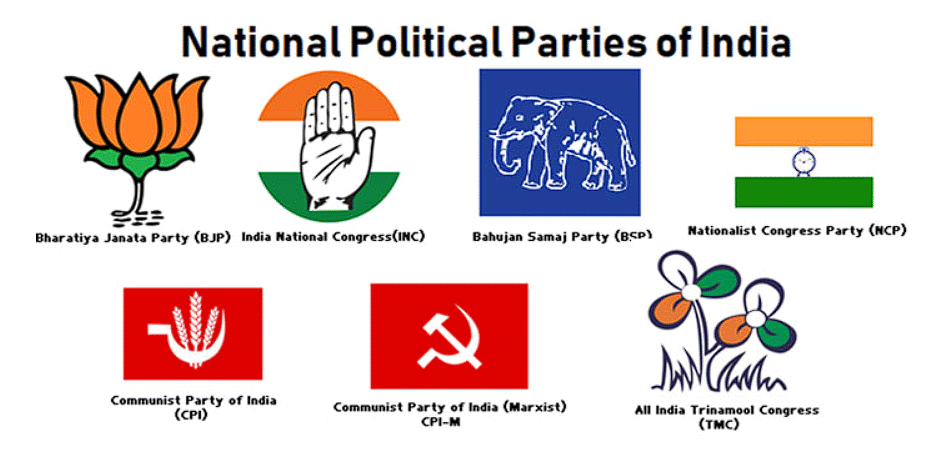
(i) In most democracies, political parties take part in elections by choosing and supporting a person as their candidate.
(ii) Voters choose a party that matches their views and opinions. To gain support, parties offer different policies and programmes so that more people feel connected to them.
(iii) Parties play a key role in making laws. The winning party's candidates become members of the legislature and executive, and they usually make laws based on their party’s earlier promises and ideas.
(iv) Parties also form and run the government. Important decisions are made by political leaders who belong to these parties. Parties train leaders, give them responsibilities, and help them become ministers to carry out their plans.
(v) Parties that do not win and do not form the government become the opposition. They keep a check on the ruling party and share different opinions to balance power.
(vi) Parties help to shape public opinion by talking about issues that matter to people and bringing them to the attention of the government.
(vii) Party members help connect people to the government by making them aware of government schemes and helping them access benefits. Since parties depend on public support during elections, they try to be more helpful and approachable than government officials.
Q2: What are the various challenges faced by political parties?
Or
Examine the main ‘challenges’ before ‘political parties.’
Ans: Main challenges before political parties: (i) Lack of internal democracy: All over the world, there is a tendency of political parties towards the concentration of power in one or a few leaders at the top. Parties do not keep a membership register. They do not regularly hold organisational meetings. They do not conduct interval elections regularly. Ordinary members of the party do not have sufficient information as to what happens inside the party. As a result, the leaders assume greater power to make decisions in the name of the party.
(i) Lack of internal democracy: All over the world, there is a tendency of political parties towards the concentration of power in one or a few leaders at the top. Parties do not keep a membership register. They do not regularly hold organisational meetings. They do not conduct interval elections regularly. Ordinary members of the party do not have sufficient information as to what happens inside the party. As a result, the leaders assume greater power to make decisions in the name of the party.
(ii) Dynastic succession is related to the first one: A rule in which the family’s generation rules forever, and there can be no change. This is against democracy. This is one of the major problems that political parties have to confront and is a hindrance for ordinary citizens who aspire to join politics.
(iii) Money and muscle power: Rich people and companies who give funds to the parties tend to influence the policies and decisions of the party.
(iv) No meaningful choice: It means, in recent years, there has been a decline in the ideological differences among parties in most parts of the world. Parties are no longer significantly different. Sometimes people cannot even elect very different leaders, either, because the same set of leaders keeps shifting from one party to another. For example, the difference between the Labour Party and the conservative party in Britain is very low.
(v) Casteism and religion have always been challenges. People prefer to vote for the representatives of their own caste and religion.
Q3: Suggest some reforms to strengthen parties so that they perform their functions well?
Ans:
(i) Internal Affairs:
(a) A law should be made to regulate the internal affairs of political parties.
(b) There should be open elections for all posts.
(c) Parties should maintain a register of members.
(ii) Women candidates:
(a) It should be mandatory to give one-third tickets to women candidates.
(b) The women should be given adequate representation in the decision-making bodies.
(iii) State funding of elections: To curb money power, there should be state funding of elections. This funding could be in kind, such as petrol or cash, as decided by the parties.
(iv) The above suggestions have not been accepted by the political parties. In such a situation, there are two other ways to reform political parties as given below:
(a) There should be pressure from the people through petitions, publicity and agitations to make political parties more serious about reforms.
(b) People should join political parties in large numbers to reform them. It is easier to reform a party from within than from outside.
Q4: What is a political party?
Ans: A political party is a group of people who come together to contest elections and hold power in the government. A political party has three important components:
(i) Party leadership
(ii) Party members
(iii) Party followers.
Political parties contest elections and occupy political offices to exercise political power.
Q5: What are the characteristics of a political party?
Ans: Characteristics of a political party
(i) A political party is a group of people who come together to contest elections and hold power in the government.
(ii) They agree on some policies & programmes for the society to promote the collective good.
(iii) Since there can be different views on what is good for all, parties try to persuade people why their policies are better than others.
(iv) They seek to implement these policies by winning popular support through elections.
(v) Parties reflect fundamental political division in a society, parties are about the part of a society & thus involve partisanship.
(vi) Thus, a party is known by which part it stands for, which policies it supports & whose interests it upholds.
Q6: A group of people who come together to contest elections and hold power in the government is called a ___________.
Ans: A group of people who come together to contest elections and hold power in the government is called a political party.
Q7: Match List I (organisations and struggles) with List II and select the correct answer using the codes given below the lists:
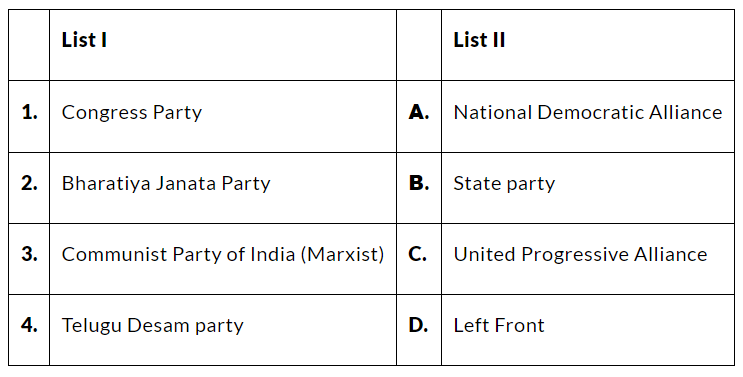
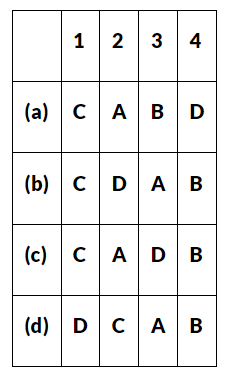
Ans:
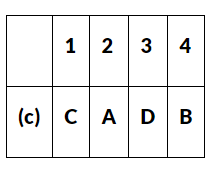
Q8: Who among the following is the founder of the Bahujan Samaj Party?
Α. Kanshi Ram
Β. Sahu Maharaj
C. Β.R. Ambedker
D. Jotiba Phule
Ans: Α. Kanshi Ram
Kanshi Ram founded the Bahujan Samaj Party (BSP) in 1984. He established the party with the goal of representing and empowering the marginalised and disadvantaged sections of society, particularly those from Scheduled Castes, Scheduled Tribes, and Other Backward Classes.
Q9: What is the guiding philosophy of the Bharatiya Janata Party?
A. Bahujan Samaj
B. Revolutionary democracy
C. Integral humanism
D. Modernity
Ans: C. Integral humanism.
The main idea behind the Bharatiya Janata Party (BJP) is called Integral Humanism, shared by its founder Deendayal Upadhyaya. This idea says that people should grow both spiritually (in values and character) and materially (in things like money and comfort). It supports a balanced way of development that follows Indian culture and tries to create a fair and peaceful society.
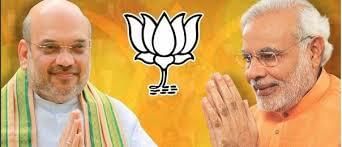 Bhartiya Janta Party
Bhartiya Janta Party
Q10: Consider the following statements on parties.
(a) Political parties do not enjoy much trust among the people.
(b) Parties are often rocked by scandals involving top party leaders.
(c) Parties are not necessary to run governments.
Which of the statements given above are correct?
(a) A, B and C
(b) A and B
(c) B and C
(d) A and C
Ans: (b) A and B
People sometimes lose trust in political parties because of problems like corruption, poor leadership, or scandals. These issues can make parties look less honest or capable. But it's not true that we don't need political parties. In a democracy, they are very important. Political parties help to organise elections, form governments, and speak for different groups of people in the country.
Q11: Read the following passage and answer the questions given below:
Muhammad Yunus is a famous economist of Bangladesh. He received several international honours for his efforts to promote economic and social development for the benefit of the poor. He and the Grameen Bank jointly, received the Nobel Peace Prize for the 2006. In February 2007, he decided to launch a political party and contest in the parliamentary elections. His objective was to foster proper leadership, good governance and build a new Bangladesh. He felt that only a political party different from the traditional ones woxild bring about new political culture. His party would be democratic from the grassroots level.
The launching of the new party, called Nagarik Shakti (Citizens’ Power), has caused a stir among the Bangladeshis. While many welcomed his decision, some did not like it. "Now I think Bangladesh will have a chance to choose between good and bad and eventually have a good government”, said Shahedul Islam, a government official. "That government, we hope, would not only keep itself away from corruption but also make fighting corruption and black money a top priority.”
But leaders of traditional political parties who dominated the country’s politics for decades were apprehensive. “There was no debate (over him) winning the Nobel, but politics is different - very challenging and often controversial”, said a senior leader of the Bangladesh Nationalist Party. Some others were highly critical. They asked why he was rushing into politics. “Is he being planted in politics by mentors from outside the country”, asked one political observer.
(a) Do you think Yunus made the right decision to float a new political party?
(b) Do you agree with the statements and fears expressed by various people?
(c) How do you want this new party organised to make it different from other parties?
(d) If you were the one to begin this political party, how would you defend it?
Ans:
(a) He has made the right decision. In a democracy, every citizen has the right to form a political party or join a political party.
(b) No, the statements and fears expressed by various people and apprehensions of the traditional political parties are baseless. Yunus has established the Grameen Bank for the welfare of the people. He knows about the welfare of the people and will be successful in politics too.
(c) The new party should be organised on democratic lines. Organisational elections should be held regularly. There should be transparency in the working of the party. Due representation should be given to all sections of the society, including women and minorities.
(d) I would defend the formation of the party on the ground that in a democracy, every citizen has a right to join or form a political party of his choice.
|
66 videos|630 docs|79 tests
|
FAQs on NCERT Solutions for Class 10 Civics Chapter 4 - Political Parties
| 1. राजनीतिक पार्टियां क्या होती हैं और इनका महत्व क्या है? |  |
| 2. भारत में प्रमुख राजनीतिक पार्टियों के नाम क्या हैं? |  |
| 3. राजनीतिक पार्टियों के प्रकार कौन-कौन से होते हैं? |  |
| 4. राजनीतिक पार्टियों के चुनावी प्रक्रिया में क्या भूमिका होती है? |  |
| 5. राजनीतिक पार्टियों के खिलाफ उठने वाले मुख्य आरोप क्या हैं? |  |

















